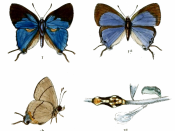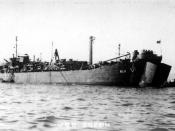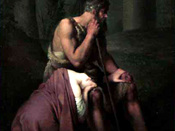1
In the play Antigone the playwright Sophocles presents Aristotle's definition of a tragic hero in the character King Creon. According to Aristotle's writing Poetics, a tragic hero is a character of noble stature that falls from his grace due to a tragic flaw, which moves the audience to feel pity for him. Creon displays the elements of a tragic hero throughout his development as a tyrant who is blind to his wrongdoings. Creon's realizes that his excessive pride causes self-destruction in his life when it is too late.
The first distinction between a tragic hero and a non-hero, according to Aristotle's definition, is a fatal flaw that leads to the character's demise. Creon possesses hubris, or excessive pride. Creon's hubris is first evident when he fails to acknowledge the will of the Gods after finding out Antigone has buried Polyneices. Creon argues with his son Haimon who feels that it is wrong to punish Antigone for she went against the law because of her strong ethics and feels that it is her moral obligation.
Creon then responds saying, "My voice is the one voice giving orders in this city! The State is the King!" (Sophocles 107). The reader is now introduced to Creon's development as a tyrant who feels that the law is more potent than ethics. Creon's hubris does not only turn Creon into a dictator but it dictates his decisions, causing him to make rash decisions. Hubris prevents Creon from recognizing his self-destructive behavior before it is too late. When Teiresias tells Creon that the gods are displeased with his decision to not bury Polyneices and condemn Antigone to death, Creon accuses Teiresias of disloyalty and succumbing to bribery. Ironically enough, in Sophocle's play Oedipus Rex Creon is accused by Oedipus of succumbing to bribery...


